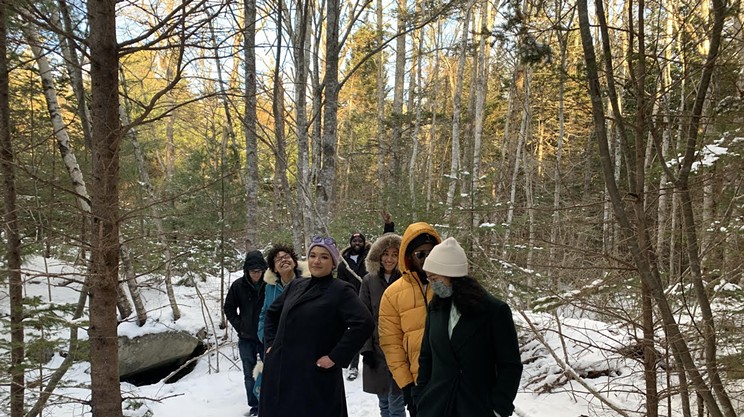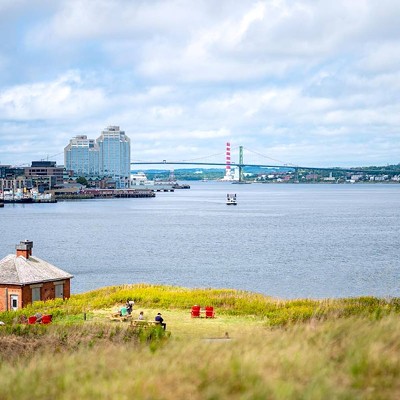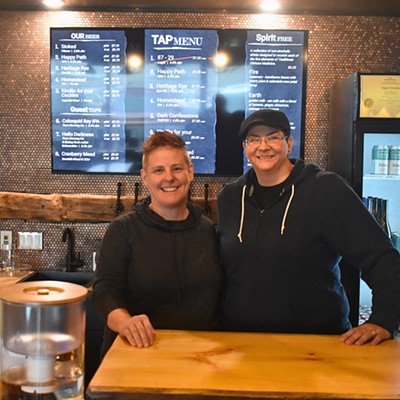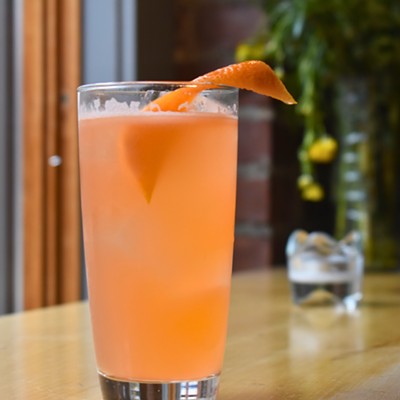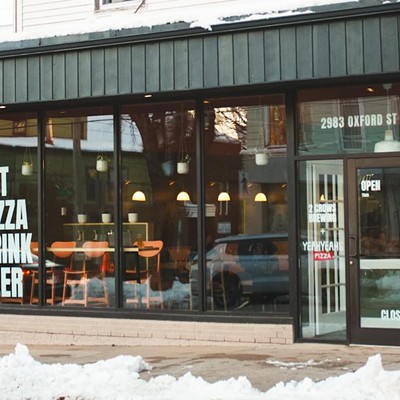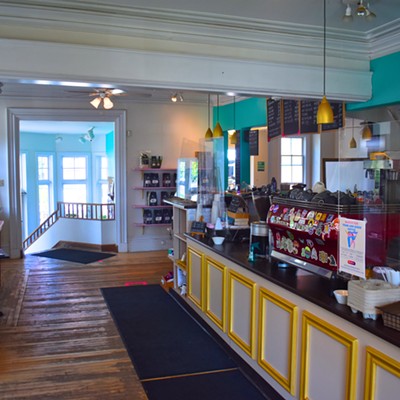
“We saw that the brewing industry was so whitewashed and were like, 'Alright, we have the capabilities of actually bringing something to the market', and that’s what we did,” says Damian McCartney, one of the co-founders of Change is Brewing Collective.
The independent collective, which partners with breweries to create beer products from start to finish and donate money back to the African Nova Scotian community, was started in June in the wake of worldwide protests against anti-Black racism after the deaths of George Floyd and Regis Korchinski-Paquet.
With everything that was going on around the world, McCartney says he and the six other co-founders needed "to be the change that we want to see." And it was Good Robot's Giovanni Johnson—Atlantic Canada's only Black brewer—who kicked it off.
Shekara Grant responded to Johnson’s Instagram story asking “‘When are going to do a BLM brew?” and he said he already had something in the works but was looking for a group who’d be interested in getting involved. From there, O’Neil Miller, Amber Zaza, LaMeia Reddick, and Jayme-Lynn Gloade also got involved, each taking on a different role.
“Brewing isn’t just making beer and selling it. There’s marketing, there’s graphics, there’s all of these other parts of it that goes with it. So between all of us, we have the skills to come up with the recipe, make the beer, package the beer, sell it, market it, do the graphics for the cans,” Grant says.
Ren Navarro also knows from experience just how white the beer industry is, both in Halifax and all across Canada. “It’s coming across the craft beer unicorn when someone else shows up and you’re like, ‘You don’t look like them,’” says the Ontario-based beer educator, who estimates only about two percent of the brewing community is BIPOC, and wants to see that increase.
For the past two-and-a-half years, Navarro has been hosting diversity and inclusion sessions with brewery owners and other beverage industry employers. “I focus on diversity and inclusion but trying to make it approachable for people, cause I feel like it’s a really scary topic and people always get so weird about it,” she tells The Coast via a Zoom call from her home in Kitchener.
After eight years working in taprooms, often the only Black woman on staff, Navarro began giving small talks at industry events.
“Beer Diversity was going to be like, I show up every so often and talk at an event that my friends are running,” says Navarro. “But this ended up being so much more.”
Six months after starting Beer Diversity, Navarro quit her day job and—until Covid hit—she travelled around Canada to educate brewery-owners, and eventually other alcohol vendors, about the importance of welcoming BIPOC people in their spaces.
“For Ontario," says Navarro, "guaranteed I’m the only one who focuses on alcohol. There’s a ton of diversity and inclusion consultants who are doing some really high-level stuff and they’re getting paid big bucks and they’re working with corporations.”
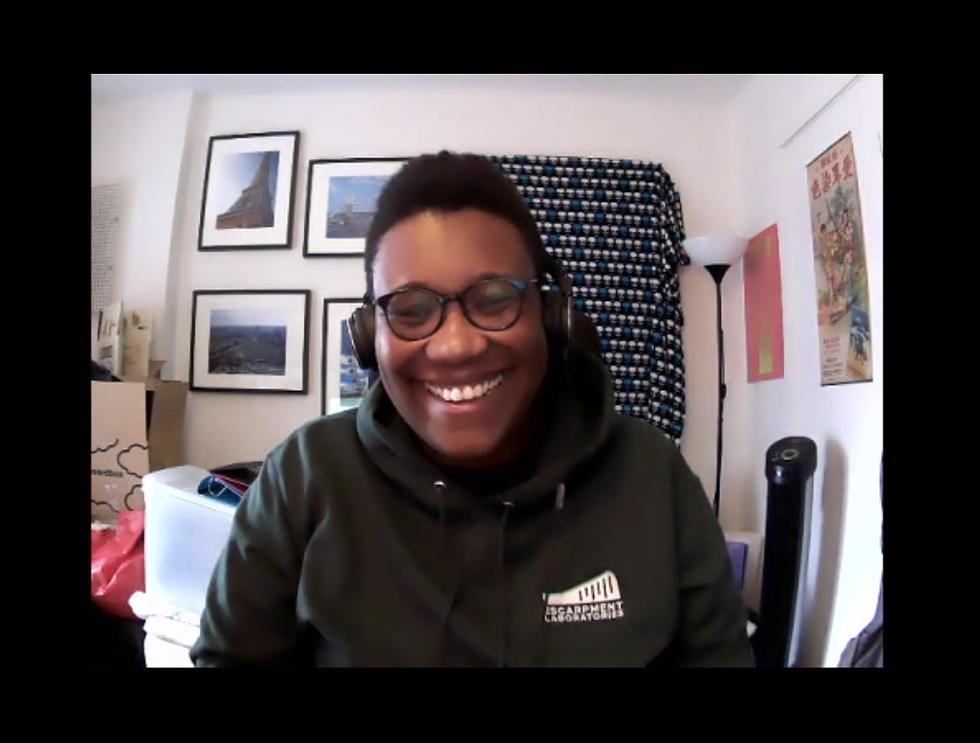
Navarro says surprisingly, people seem even more willing to open up and ask tough questions in a Zoom chat. “They’re in their safe spaces, quite often a dog or a cat will wander through the frame and it’s like OK, like you’ve got your support animal around you so you can ask the questions that you were too scared to ask before,” she adds.
No two sessions are the same, but some things come up repeatedly, like hiring practices, marketing and being more involved in the community.
“It’s really not about me talking at people, cause I find that incredibly boring,” says Navarro. “And because it’s such a daunting topic as it is, these are really interactive sessions. I’ll talk for 15, 20 minutes and give you the rundown and who I am and what things have been happening and why we’re here, and then we just start talking.”
For the collective, there’s good reason to bring attention to the problematic parts of the brewing community. “Something that we’ve identified is that access to beer knowledge is very very hard to get to. It’s not an accessible industry,” Grant says, sitting inside 2 Crows on a late fall day.
The Change is Brewing Collective has brought three beers and a cider to fruition since this summer, and has done so by working with breweries who, like them, are interested in putting in the work to diversify the beer industry. “We’re at the forefront, trying to make sure that we do it the proper way, to make sure that people can see that it’s possible for it to happen,” says McCartney.
The collective’s first beer, the BlackBerry Freedom Pale Ale, was released in early July, and the 20 barrels sold out in just five weeks.
Partnering with Good Robot Brewing Company, Change is Brewing donated 50 percent of the proceeds of BlackBerry to BIPOC youth and community groups in the province, like Blxckhouse in Preston.
“It’s an actionable way for people to make the difference that we keep hearing about,” says Grant, “because every product that you buy that has Change is Brewing on it, you know that those profits are going to diversifying this industry.”
More than just donating to organizations that support Black youth and empowering Black people to get involved in the brewing process, the Blackberry Freedom Pale Ale was made for and marketed to the Black community. “Blackberries have always been pretty significant in the Black culture especially,” says Grant. “Tupac talks about it in a lot of his songs, you know, the blacker the berry the sweeter the juice.”
The collective’s second brew, Cherry Brook Wheat Ale, was brewed in partnership with North Brewing in Dartmouth and proceeds will go to the Black Cultural Centre.
While coming up with the recipe, McCartney says he and the collective knocked on doors and handed out flyers in Cherry Brook. “We actually spoke with people face to face,” he says. They plan to continue this approach and make sure the Black communities are involved and, McCartney says, “know we’re doing it for them.”
McCartney says you can make a beer unique to whatever you want. “You can make a beer about dogs if you want, you can make a beer about ducks if you want,” he says. “But if you want to make a beer or make something that actually everyone can enjoy, you can tap into that community, you can find out what their likes, their dislikes are, or even just their history.”
The collective partnered with 2 Crows for its third beer, Good News, which launched in late October. This beer is “light and fun" in contrast to some of their conceptually heavy brews, says Grant. Its proceeds are headed to the Africville Museum.
And earlier this month, Change is Brewing released its latest beverage, Forest Glory cider, partnering with Lake City Cider, made with NS apples, cranberry juice, and infused with juniper, rosemary and thyme.
The collective’s partner breweries have offered Change is Brewing access to their equipment and expertise, something both Grant and McCartney say is crucially important.
“They’re so open and so willing to help us out and give us whatever resources they have at their disposal for us to use. So just going forward if any brewery is looking to do something like that, have the same common goal, then we’re all for it,” says McCartney.
Navarro says that common goal is central to her work too, with many of the breweries she’s worked eager to get on board and learn how to move forward.
“I think there’s some really big changes happening across Canada but Nova Scotia’s definitely jumping on to a bunch of things,” she says, like North Brewing, which has advocated for inclusion for years and recently launched a Diversity and Inclusion Scholarship.
But other employers have been more hesitant about taking action. “I think people are always worried about being seen as being performative. And the initial post that you do will always be seen as performative. It’s the question of what you do after,” Navarro says.
Even with increased interest and genuine intention, Navarro thinks it’s hard to get past the mainstream notions of what supporting the Black and BIPOC community means.
“Part of what I’m trying to do is get people out of this thought of, ‘I need to hire Black people’. If we don’t exist in your area and we don’t exist in your taproom, then we can’t suddenly show up and apply to your job,” Navarro says. “It’s getting people to look at like the full diversity range and start asking, ‘What is the diversity around me?’ And in some places that’s an Indigenous community.”
While many breweries pledged to do the work behind the scenes, and as such are keeping quiet about their plans until they can gauge potential public reaction, Navarro says she wants to hear from them, too.
“A really big push of mine was, tell us what you’re planning. Because you’ll tell me about like the newest hops that you’ve got for the year,” she says. “No one cares anymore. Hops go in beer, we know. But tell me that you’re working on something that helps your community.”
The Halifax breweries that have done something have done it right though, she adds. “Those who have done things have done them like, huge. And that’s either from changing the representation, or adding more representation in their social media posts, or changing some of their language,” she says. “Or like, what are your pronouns? Put it in your email signature and things like that where they’re small pieces but they have such huge reach.”
Whether it's people of colour or anyone who's not a straight white dude with a beard–they can be into beer and it's not a strange thing, says Navarro. "It’s such a weird thing, but we hold onto these stereotypes so tightly, and it’s really hard to break out of it.”
McCartney and Grant agree that while local breweries are changing for the better, the long-lasting change—change that can actually shift stereotypes—is often slow.
“There definitely are some people that are putting in the work. But a lot of people think it’s more of a challenge than it is. People don’t understand that they are the owners in this business, so they have the ability to create the space and to create the opportunity for others,” says Grant.
It can sometimes it can feel like there aren't enough people taking action fast enough, adds McCartney. “Everyone wants to talk about it, everyone wants to make posts and repost and whatnot, but actually doing something, that looks like the challenge some people have. I feel like once people get over that hump, then it’ll be all for the best.”
Over the coming months, Change is Brewing plans to work with more businesses, but only those that are actually walking the walk, not just talking the talk.
“With North and 2 Crows what’s important to note is that they were doing this work before June, before it was trendy to do so. So that’s why they were the first two that we went to. Going forward, we do have a request form for breweries or any company that wants to work with us, but it’s important that they’re already doing the work in their community,” says Grant. “We aren’t just trying to bring media attention to a brewery for the sake of doing that. We want them to actually believe in the things that we believe in, and do the work.”
Grant, like Navarro, agrees that actions don’t have to be expensive and planned for months and months. They can be simple and start small.
“Brewing and beer is supposed to be about community, it’s supposed to be about bringing people together. If that’s not happening in your space I feel like that’s the right place to start,” she says. “You don’t have to do something as grand as a scholarship, it doesn’t have to be on that level. It can just be diversifying your clientele.”
Change is Brewing is also taking its own advice about getting out into the community. It's holding information sessions called Brew 101 to help develop its upcoming creations.
“We did one recently at Africville by the church—that was recipe development where we had different ingredients set out on the table, books with information that anyone could’ve walked up and asked us about,” says McCartney. “The community is giving all their feedback on it and that’s going to be for them. We’re just the means of bringing all the ideas and all the efforts together and making it happen.”
At that session, they were reminded that though people of colour may be underrepresented in taprooms today, that doesn’t mean they don’t have a history of brewing. The group met a former resident of the historic African-Nova Scotian community.
“He told us stories about how he would brew with molasses which provides fermentable sugars and raisins and all that stuff, and brown sugar. They would put it in their fishing barrels and then bury it in the ground because the soil’s cold so it keep it cool,” Grant says, “So I think that just kind of proves that these skills have been here for generations.”
McCartney hopes through the collective, he can inspire youth to follow their passion if it happens to be brewing. “There’s so much different industries that go into brewing, we’ve got plumbing, carpentry, PR, management. We feel like there’s opportunities for youth now to gain knowledge, so they can grow up in the industry,” he says. “They don’t have to do beer, we have programs going on for children where they can brew their own tea or they could brew coffee.”
Grant says Brew101 is a way of ensuring the industry is open to everyone. “We’re trying to make it more accessible and try to explain like, you can make beer in your kitchen. If you want to make beer you can make beer in your kitchen, it doesn’t have to be this big commercial thing, it doesn’t have to be a big brewery,” adds Grant. “If this is something you’re passionate about, you can do it yourself.”


